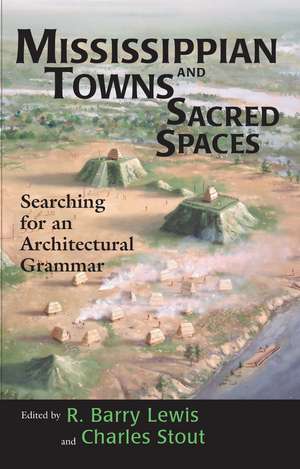Mississippian Towns and Sacred Spaces: Searching for an Architectural Grammar
Editat de R. Barry Lewis, Charles Stout Contribuţii de Dr. Jon Muller, Gerald F. Schroedl, Hypatia Kelly, John F. Scarry, Robert L. Hall, Tristram R. Kidder, Claudine Payne, Cameron B. Wessonen Limba Engleză Paperback – 28 oct 1998
Archaeologists and architects draw upon theoretical perspectives from their fields to provide valuable insights into the structure, development, and meaning of prehistoric communities.
Architecture is the most visible physical manifestation of human culture. The built environment envelops our lives and projects our distinctive regional and ethnic identities to the world around us. Archaeology and architecture find common theoretical ground in their perspectives of the homes, spaces, and communities that people create for themselves. Although archaeologists and architects may ask different questions and apply different methods, the results are the same—a deeper understanding of what it means to be human.
In this volume, prominent archaeologists examine the architectural design spaces of Mississippian towns and mound centers of the eastern United States. The diverse Mississippian societies, which existed between A.D. 900 and 1700, created some of the largest and most complex Native American archaeological sites in the United States. The dominant architectural feature shared by these communities was one or more large plazas, each of which was often flanked by buildings set on platform mounds. The authors describe the major dimensions of an architectural grammar, centered on the design of the plaza and mound complex that was shared by different societies across the Mississippian world. They then explore these shared architectural features as physical representations or metaphors for Mississippian world views and culture.
Architecture is the most visible physical manifestation of human culture. The built environment envelops our lives and projects our distinctive regional and ethnic identities to the world around us. Archaeology and architecture find common theoretical ground in their perspectives of the homes, spaces, and communities that people create for themselves. Although archaeologists and architects may ask different questions and apply different methods, the results are the same—a deeper understanding of what it means to be human.
In this volume, prominent archaeologists examine the architectural design spaces of Mississippian towns and mound centers of the eastern United States. The diverse Mississippian societies, which existed between A.D. 900 and 1700, created some of the largest and most complex Native American archaeological sites in the United States. The dominant architectural feature shared by these communities was one or more large plazas, each of which was often flanked by buildings set on platform mounds. The authors describe the major dimensions of an architectural grammar, centered on the design of the plaza and mound complex that was shared by different societies across the Mississippian world. They then explore these shared architectural features as physical representations or metaphors for Mississippian world views and culture.
Preț: 208.26 lei
Nou
Puncte Express: 312
Preț estimativ în valută:
39.85€ • 42.61$ • 33.23£
39.85€ • 42.61$ • 33.23£
Carte indisponibilă temporar
Doresc să fiu notificat când acest titlu va fi disponibil:
Se trimite...
Preluare comenzi: 021 569.72.76
Specificații
ISBN-13: 9780817309473
ISBN-10: 0817309470
Pagini: 320
Dimensiuni: 156 x 235 x 28 mm
Greutate: 0.51 kg
Ediția:First Edition, First Edition
Editura: University Of Alabama Press
Colecția University Alabama Press
ISBN-10: 0817309470
Pagini: 320
Dimensiuni: 156 x 235 x 28 mm
Greutate: 0.51 kg
Ediția:First Edition, First Edition
Editura: University Of Alabama Press
Colecția University Alabama Press
Notă biografică
R. Barry Lewis is Professor of Anthropology at the University of Illinois-Urbana-Champaign. Charles Stout is Director of Development and Assessments, The Quantum Muse Company.
Recenzii
"This is an important volume and deserves to be on the bookshelf of any southeastern archaeologist, particularly those interested in Mississippian sites. . . . Lewis and Stout are to be commended for bringing this wealth of information to us and stretching our minds to think in new ways about space and its use in Mississippian towns—however we choose to define them."
—Southeastern Archaeology
"Lewis and Stout offer a fresh view of Mississippian settlements, shifting the emphasis from mounds and mound groups to the spaces that define and are defined by mound-and-plaza construction. The contributors go beyond analysis of settlement pattern and examine site layout as architectural grammar, providing a welcome and provocative addition to the literature."
—Alex Barker, Dallas Museum of Natural History
Descriere
In this volume, prominent archaeologists examine the architectural design spaces of Mississippian towns and mound centers of the eastern United States.
